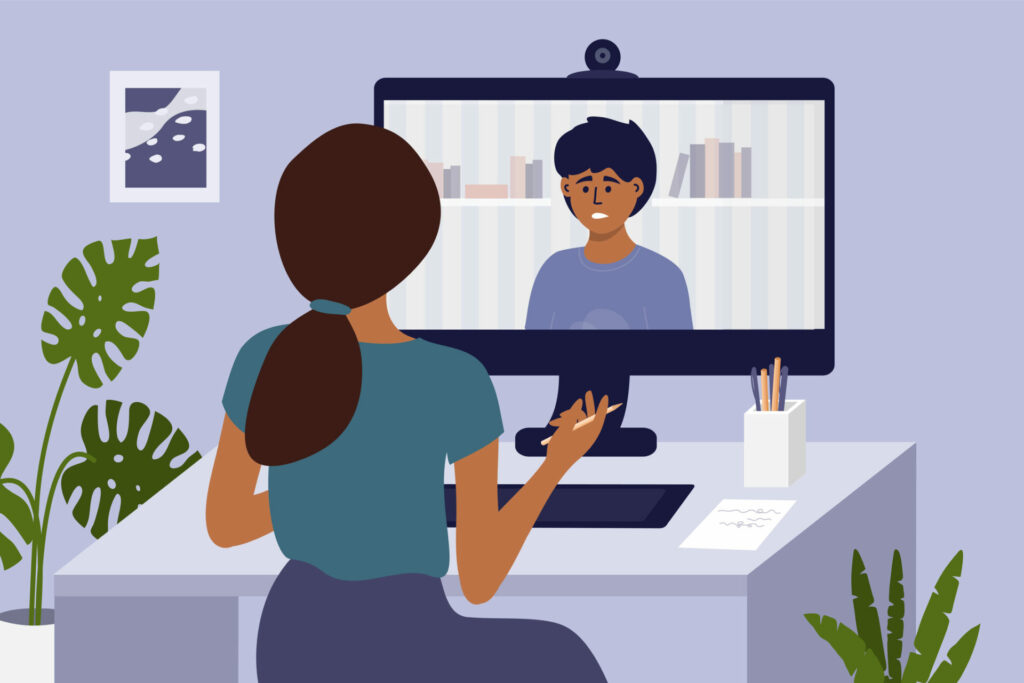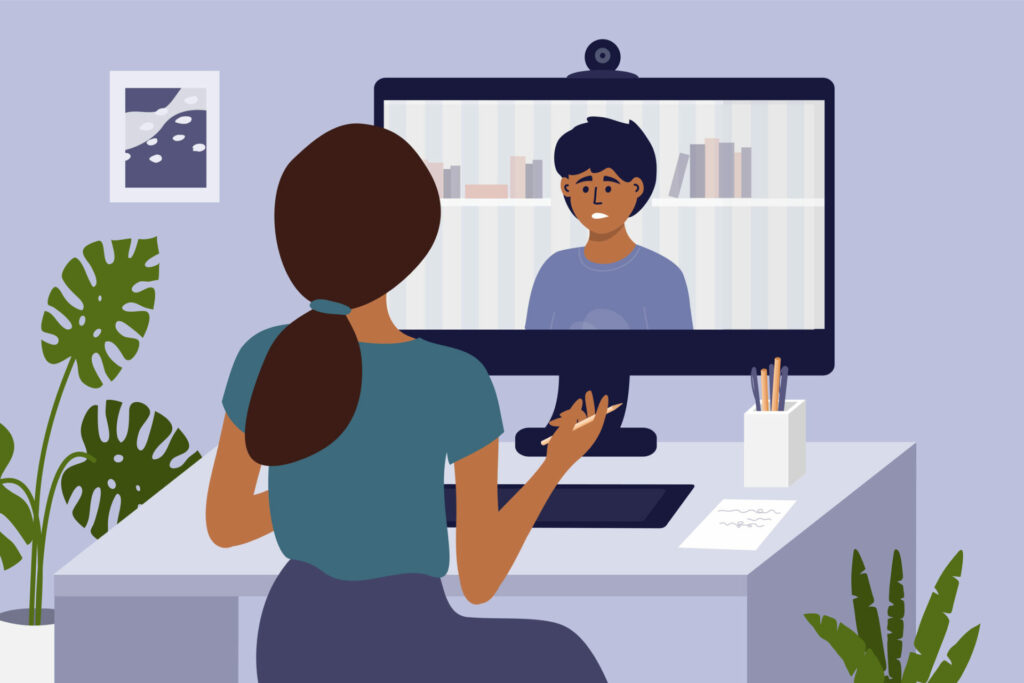Online psychological counseling, also known as e-counseling, is a type of mental health service that allows individuals to receive therapy from licensed mental health professionals via the Internet. With the rise of technology and the convenience it offers, online counseling has become increasingly popular, making it easier for people to access therapy from the comfort of their own homes. In this blog, there is detailed information on online psychological counseling.
Contents
What is Online Psychological Counseling?
Online psychological counseling is similar to traditional in-person therapy sessions, but instead of meeting face-to-face with a therapist, the sessions are conducted over the Internet using video, phone, or messaging platforms. This type of counseling can be conducted in real-time, allowing individuals to communicate with their therapist in real-time, or can be done asynchronously through messaging or email.
Online counseling is a flexible, convenient, and cost-effective alternative to in-person counseling. It can be particularly helpful for those who are unable to attend in-person sessions due to physical or logistical barriers, such as living in a remote area, having mobility issues, or having a busy schedule.
The Benefits of Online Psychological Counseling

These are some of the benefits of online psychological counseling:
- Convenience: Online counseling allows individuals to receive therapy from the comfort of their own homes. This can be particularly helpful for individuals who have mobility issues, live in remote areas, or have busy schedules.
- Access: Online counseling allows individuals to access therapy from anywhere in the world. This can be especially important for individuals who live in areas where mental health services are not readily available.
- Affordability: Online counseling can be more affordable than in-person therapy. Since there are no overhead costs associated with a physical office, therapists can charge less for their services.
- Flexibility: Online counseling offers greater flexibility than in-person therapy. Individuals can schedule sessions at a time that is convenient for them and can communicate with their therapist via messaging or email outside of scheduled appointments.
- Increased privacy: Online counseling provides an added level of privacy for individuals who may be uncomfortable seeking therapy in person. This can be especially important for individuals who are dealing with sensitive issues that they may not want to discuss in a public setting.
- Reduced Stigma: Online counseling can help reduce the stigma associated with seeking therapy. Since individuals can receive therapy from the comfort of their own homes, they may feel more comfortable seeking help for their mental health issues.
- Diversity and Cultural Sensitivity: Online counseling allows individuals to seek therapy from mental health professionals who are culturally sensitive and understand their unique backgrounds and experiences. This can be particularly helpful for individuals from diverse backgrounds who may face additional barriers in accessing mental health services.
Working in Online Psychological Counseling
Here’s how online counseling typically works:
- Finding a Therapist: The first step is to find a licensed mental health professional who provides online counseling services. This can be done through online directories or recommendations from friends or family members.
- Initial Consultation: Once a therapist has been identified, an initial consultation will be scheduled. This consultation can take place over the phone or via video conferencing software. During this consultation, the therapist and client will discuss the client’s mental health concerns, treatment goals, and whether online counseling is the best option.
- Scheduling Sessions: If both the therapist and client agree that online counseling is appropriate, the therapist and client will schedule regular sessions. These sessions may take place using video conferencing software or via messaging or email platforms.
- Conducting Sessions: During online counseling sessions, the therapist and client communicate using the chosen platform. The therapist will typically use talk therapy techniques to help the client work through their mental health concerns. Depending on the therapist’s approach, sessions may involve guided meditation, breathing exercises, or other techniques.
- Follow-up and Progress Tracking: Following each session, the therapist may provide the client with homework or exercises to work on between sessions. They will also track the client’s progress and adjust their treatment plan as needed.
- Termination: Once the client has made progress and achieved their treatment goals, the therapist may terminate the counseling relationship. The therapist and client may discuss whether additional sessions are needed or if the client is ready to end treatment.
Techniques Used In Online Psychological Counseling

While online counseling is similar to traditional in-person therapy, some techniques are particularly effective in the online environment. Some of these are:
- Cognitive-behavioral therapy (CBT)
Cognitive-behavioral therapy is a type of talk therapy that focuses on identifying and changing negative thought patterns and behaviors. CBT is one of the most commonly used therapeutic approaches in online counseling because it is well-suited to the online environment. CBT is typically delivered through a structured program of worksheets and exercises that can be completed online.
- Mindfulness-based therapy
Mindfulness-based therapy is a type of therapy that focuses on cultivating mindfulness, or the ability to be present at the moment and to observe thoughts and feelings without judgment. Mindfulness-based therapy is particularly effective in the online environment because it can be practiced through guided meditations that can be accessed online.
- Solution-focused brief therapy
Solution-focused brief therapy is a type of therapy that focuses on identifying and implementing solutions to specific problems. This approach is particularly effective in the online environment because it can be delivered through a structured program of exercises and worksheets that can be completed online.
Art therapy is a type of therapy that uses creative expression to help individuals explore and process their emotions. Online art therapy is becoming increasingly popular, with therapists using video platforms to guide clients through creative exercises.
Narrative therapy is a type of therapy that focuses on helping individuals reframe their experiences. Also, create new narratives for their lives. Narrative therapy can be particularly effective in the online environment. This is because it allows individuals to reflect on their experiences and create new narratives through written exercises and journaling.
- Online support groups
Online support groups can be an effective way for individuals to connect with others who are dealing with similar issues. Support groups can be particularly helpful for individuals who may feel isolated or alone in their experiences.
EMDR therapy is a type of therapy that is particularly effective in treating trauma. EMDR therapy can be delivered online using specialized video platforms that allow therapists to guide clients through the process of reprocessing traumatic memories.
Limitations of Online Psychological Counseling
Here are some of the limitations of online counseling:
- Technical difficulties: Online counseling requires a reliable internet connection and a functioning device. Technical issues such as poor video quality, internet connectivity issues, or device malfunctioning can interrupt or impede the therapeutic process.
- Limited Non-Verbal Cues: Online counseling may not offer the same level of non-verbal cues as in-person counseling. This can make it difficult for therapists to pick up on non-verbal cues such as body language or facial expressions, which can be important in assessing a client’s emotional state.
- Security and Privacy Concerns: Online counseling involves transmitting personal and sensitive information over the Internet. Therapists must take appropriate measures to ensure the confidentiality and security of their client’s information.
- Limited Modalities: Online counseling may not be suitable for all types of mental health issues. Certain issues may require in-person therapy or a combination of online and in-person therapy.
- Lack of Physical Interaction: Online counseling does not allow for physical interactions such as handshakes or hugs, which can be important for establishing a connection between the therapist and the client.
- Ethical and Legal Concerns: Online counseling requires adherence to ethical and legal guidelines that may differ from in-person counseling. For example, there may be different licensing requirements or rules for handling sensitive information.
What Can Online Psychological Counseling Treat?

Here are some of the mental health conditions that can be treated through online counseling:
- Depression: Online counseling can be an effective treatment for depression, including major depressive disorder and persistent depressive disorder.
- Anxiety: Online counseling can be used to treat various anxiety disorders, including generalized anxiety disorder, social anxiety disorder, and panic disorder.
- Post-traumatic stress disorder (PTSD): Online counseling can be effective in treating PTSD, especially when combined with other forms of treatment such as medication and in-person therapy.
- Eating disorders: Online counseling can be used to treat eating disorders, including anorexia nervosa, bulimia nervosa, and binge eating disorder.
- Obsessive-compulsive disorder (OCD): Online counseling can be an effective treatment for OCD, especially when combined with medication.
- Substance abuse: Online counseling can be used to treat substance abuse disorders, including alcoholism and drug addiction.
- Relationship Issues: Online counseling can help individuals work through relationship issues, such as communication problems, infidelity, and intimacy issues.
- Stress management: Online counseling can be used to help individuals develop effective coping skills for managing stress and anxiety.
Conclusion
Online psychological counseling is a convenient and accessible way for individuals to receive the mental health support they need. It allows patients to connect with professional counselors from anywhere in the world and on their schedules. While there are some limitations to this type of counseling, such as potential technical issues or lack of personal connection, the benefits often outweigh these drawbacks.
If you’re struggling with mental health concerns but feel hesitant about traditional face-to-face therapy sessions, consider giving online counseling a try. With advancements in technology making it easier than ever before, taking care of your mental well-being has never been more accessible or attainable.
For more information, please contact MantraCare. Online therapy includes videoconferencing, phone sessions, messaging-based therapy, chat-based therapy, and therapy based on different problems. If you have any queries regarding Online Counseling experienced therapists at MantraCare can help: Book a trial therapy session


